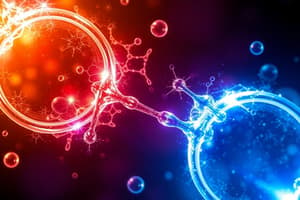Podcast
Questions and Answers
What type of bond is formed when two atoms share electrons?
What type of bond is formed when two atoms share electrons?
Covalent bond
Why do ionic structures have high melting and boiling points?
Why do ionic structures have high melting and boiling points?
It requires a lot of energy to break down the ionic lattice.
Why are covalent molecular substances poor conductors of electricity?
Why are covalent molecular substances poor conductors of electricity?
They have no free electrons to carry electric current.
What happens to metals in ionic bonding?
What happens to metals in ionic bonding?
Why are ionic structures brittle?
Why are ionic structures brittle?
What type of ions do non-metals form in ionic bonding?
What type of ions do non-metals form in ionic bonding?
Why does diamond have a very high melting point?
Why does diamond have a very high melting point?
Why is diamond used as a cutting tool?
Why is diamond used as a cutting tool?
Why doesn't graphite conduct electricity?
Why doesn't graphite conduct electricity?
Why is graphite soft and slippery?
Why is graphite soft and slippery?
Explain why silica (Silicon dioxide) is like diamond.
Explain why silica (Silicon dioxide) is like diamond.
Describe the formation of positive ions and negative ions.
Describe the formation of positive ions and negative ions.
Flashcards are hidden until you start studying




